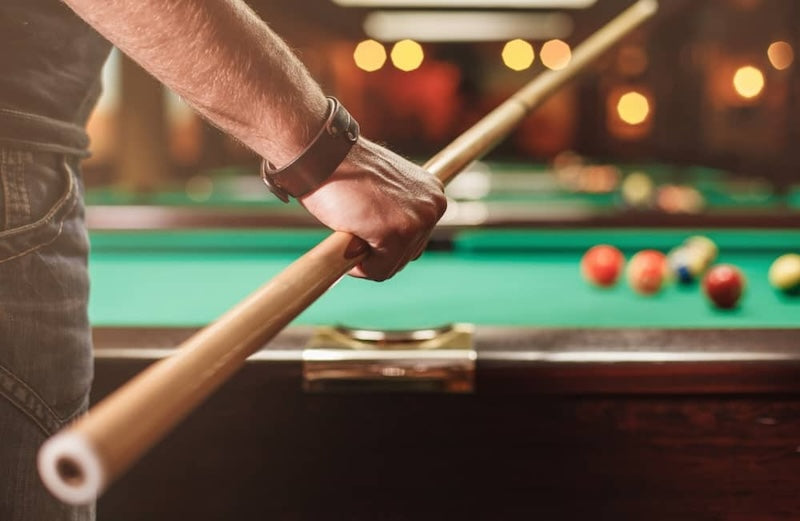
How to Choose a Pool Cue? 8 Things to Consider When Picking Pool Cues
In pool games, the difference between a win and a loss often hinges on the equipment. Knowing how to choose a pool cue that aligns with your skill level, playing style, and specific needs is important. Therefore, Big Cat aims to take the guesswork out of selecting pool cue by providing 8 key considerations to guide you through the process.
Whether you're a casual player or aiming for pro status, understanding how do you choose a pool cue can significantly impact your performance and enjoyment of the game. Read on to find out how to make an informed decision on selecting pool cue that's right for you.
How to Choose a Pool Cue?
1. Budget and Skill Level
Before knowing how to choose a pool cue, your budget is also an essential factor in deciding which pool cue to buy. If you're a beginner, you can find crucial sticks ranging between $100 and $150, which should be enough for intermediate learning. If you're an experienced player looking to upgrade, your options can vary from $350 to $1,500, depending on performance requirements.
2. One-Piece vs. Two-Piece Cues
Deciding between a one-piece and a two-piece cue can affect your gameplay and convenience. Two-piece lines are generally more portable and easier to manage, especially if you bring them along. A one-piece cue works best as a rack filler as they are harder to fix if they warp, unlike a two-piece cue where you can replace the shaft.

One-Piece vs. Two-Piece Cues. Image source: Game and Entertain
See more: How to make a pool cue?
3. Material Choices
Pool cues can be made from wood, fiberglass, graphite, and hybrids. Wood is the preferred choice for professionals because of its natural feel and strength. However, fiberglass and graphite are good alternatives, especially for beginners, due to the lower cost and resistance to warping.
4. Cue Length
Cue length is one of the most important factors that intermediate players pay attention to the most. Pool players may want to hold a pool stick that matches their height for comfortable gameplay.

Cue length. Image source: Billiard Directs
A standard 58-inch cue generally fits people between 6' 5" and 5' 8". A 48-inch or 52-inch cue for shorter players or a longer stick for taller individuals.
5. Cue Weight
If you want to straighten the pool cue, weight should be a highly-considered factor. Most cues weigh between 17 and 21 ounces. However, a weight between 17 and 19 ounces is excellent for multiple cues.
6. Ferrule Material
The ferrule between the tip and the shaft is responsible for shock absorption. High-quality cues usually come with solid ferrules that only need to be replaced briefly. Materials like Juma, Ivorine-4, and Aegis-2 are popular. Notice that choosing ferrule is also a matter of personal preference.

Ferrules. Image source: Sahm Splice
7. Cue Wraps
Cue wraps can be made of leather, linen, rubber, or sometimes even without a wrap. Leather and linen are good options for those who sweat a lot, as they absorb moisture more effectively.
8. Tip Hardness
The cue tip makes direct contact with the ball and significantly affects your shots:
- Soft tips wear out quicker but are great for spin shots
- Hard tips last longer but provide less control for spin
- Medium tips balance durability and control and are commonly used in standard pool cues
If you want to replace the tip when playing, choosing the right tip at the beginning is necessary.
3 Best Pool Cues for Beginners, Intermediate, and Advanced Players
Big Cat I Red Silver
How to choose the right pool cue is no longer a confusing question with The Big Cat 1 Red Silver. This pool cue is an ideal choice for beginners. Its classic design features a durable dark silver body accented by bright red and a white handle, making it stylish and long-lasting. Intermediate and advanced players can also find cues from Big Cat tailored to their needs for improved gameplay.
Big Cat III Blue Black
Intermediate players may find the Big Cat 3 Blue Black pool cue an excellent fit. This cue boasts a timeless design, blending a blue and black color scheme with a white handle for a distinguished look. The traditional crafting techniques ensure the cue's durability and prolonged performance, making it a reliable choice for players looking to elevate their game.
Big Cat VI Grey Silver
The Big Cat VI Grey Silver pool cue is a prime option for advanced players. Featuring a modern yet timeless design, this cue blends dark grey and silver hues with a unique grey handle. Crafted from high-quality materials, it ensures long-lasting performance and is designed to meet the needs of the most demanding pool players. With Big Cat VI, you can expect a cue that will keep your game at its peak for years.
See more: Best pool cue for the money
Frequent Asked Questions
How Much Money Should I Spend On Cue?
A pool stick ranging between $100 to $150 is good enough for beginners. However, the amount of money you spend on a pool cue also depends on your desired skill level and experience in the game.
How Do I Know What Pool Cue to Buy?
When choosing a pool cue, size and straightness are vital considerations. A standard two-piece 58-inch cue is generally suitable for individuals with a height range of 5' 8" to 6' 5". Suppose you're taller than 6' 5", you might benefit from a longer stick to play comfortably. Conversely, if you're a child or shorter, a 48" or 52" cue could be more appropriate.
In addition to size, it's crucial to check for the straightness of the stick, as a warped cue can severely affect your gameplay.
Which Cue Material Is The Best?
The "best" material for a pool cue can vary depending on your needs and level of expertise. Wood is the preferred material for most professional players due to its superior feel and performance characteristics. However, fiberglass and graphite cues also offer advantages, particularly for beginners or those on a tighter budget.
Is Wood the Best Material for a Cue Stick?
Wood is the most popular material for a cue stick, especially among professional players, because of its superior feel and performance characteristics. However, "best" can be subjective and dependent on individual needs as fiberglass and graphite cues also offer benefits like durability and resistance to warping and a lower cost.
What Weight of Pool Cue Should I Use?
A cue weight between 17 to 19 ounces is great for snooker, standard English, and Australian pool. In the broader context, pool, snooker, and billiard cues range from 17 to 21 ounces, so you may want to experiment within this range to find the most comfortable weight and enhance your gameplay.
In conclusion, knowing how to choose a pool cue that aligns with your skill level, playing style, and budget can make a difference in your game. Considering the 8 critical factors outlined in this blog, you'll be well on your way to selecting a pool cue that elevates your performance and maximizes enjoyment. Make an informed choice and take your pool game to the next level.
See more related articles:


